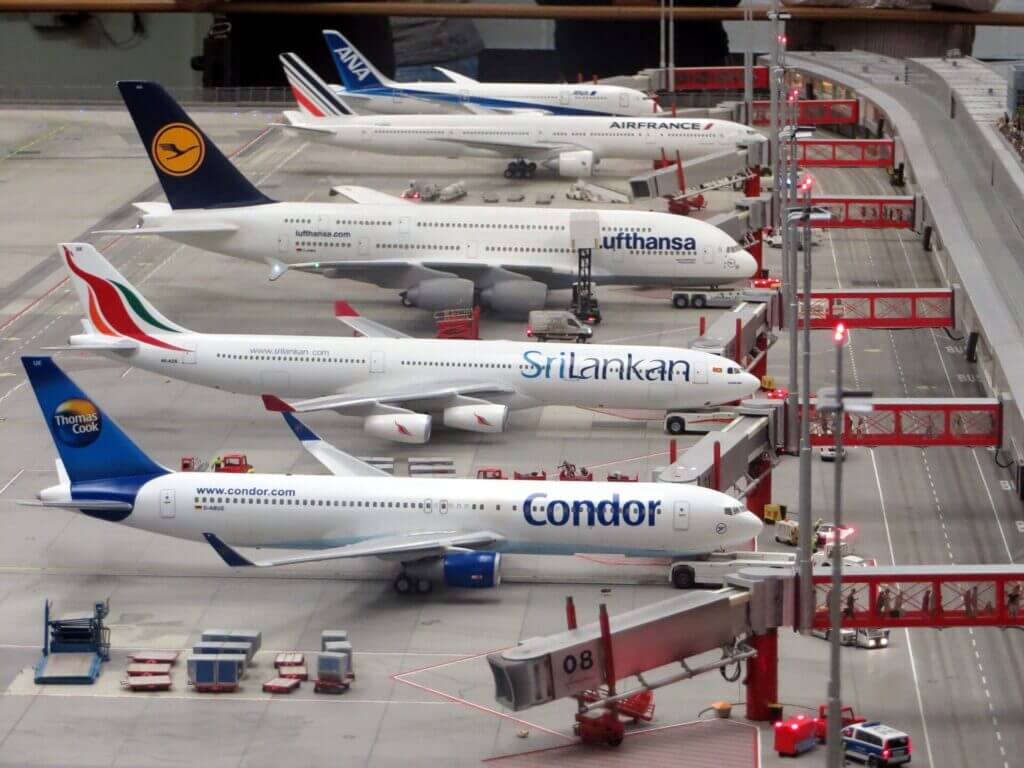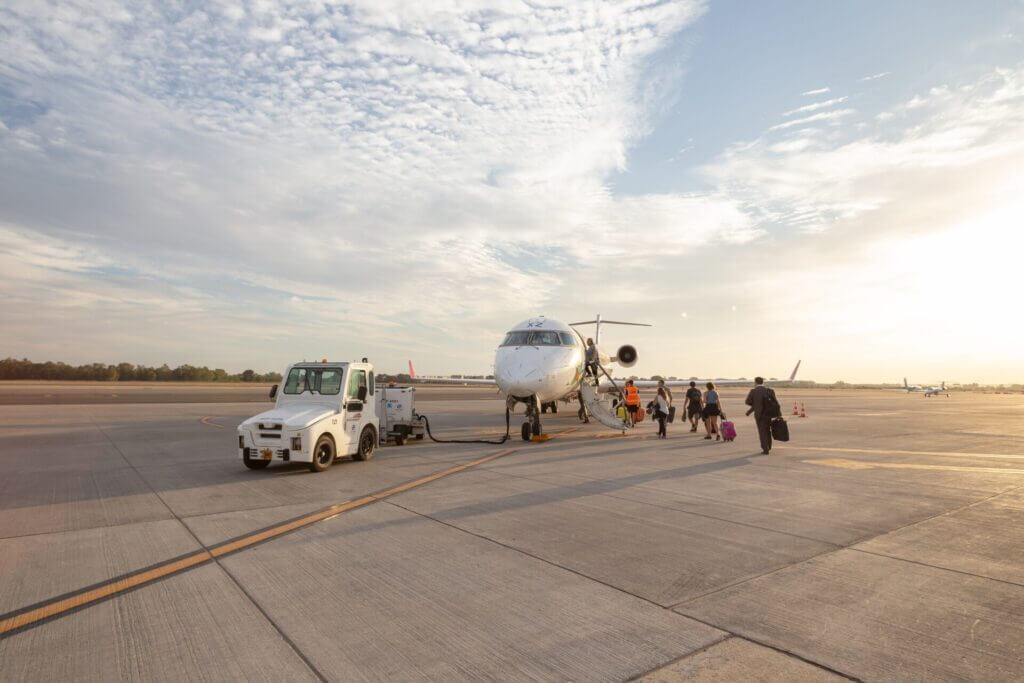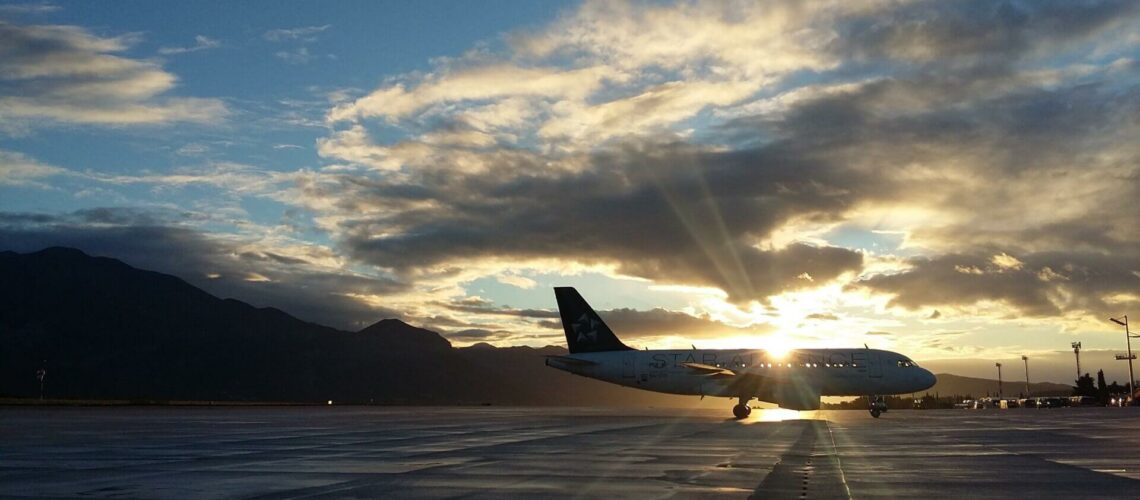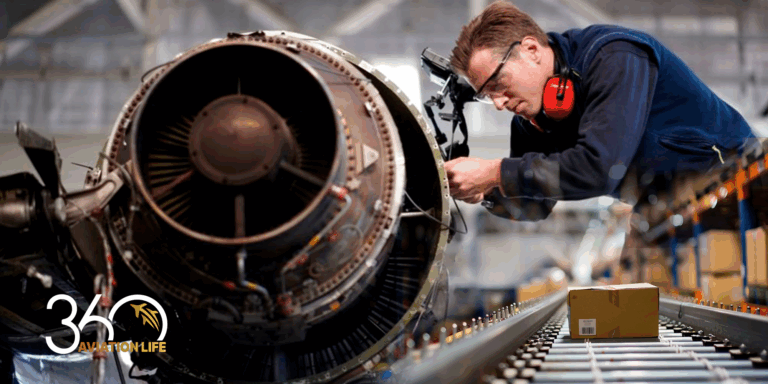Ya hemos visto lo que son las fases de vuelo de un avión y analizamos en qué consistía cada una de ellas. Ahora bien, hay otra etapa que, si bien no forma parte del vuelo de un avión propiamente dicho, es esencial para la seguridad de los pasajeros y la tripulación: la asistencia en tierra a aeronaves.
Por eso, hoy en 360 Aviation Life te explicamos en detalle de qué se trata este tópico, su relevancia en el mundo de la aviación y qué cursos de formación pueden capacitarte en este campo.
Tabla de Contenidos
¿Qué es la Asistencia en tierra a Aeronaves?
La asistencia en tierra a aeronaves, también conocida como «handling» o «manejo en tierra de aeronaves«, se refiere a las diversas tareas y servicios realizados en tierra para asegurar el funcionamiento seguro y eficiente de los aviones en los aeropuertos.
Estas actividades son llevadas a cabo por empresas de servicios de handling en tierra, que se encargan de brindar asistencia a las aeronaves, tripulaciones y pasajeros durante su tiempo en tierra.

¿Para qué sirve la Asistencia en tierra a Aeronaves?
El objetivo principal de la asistencia en tierra a aeronaves es garantizar un flujo operativo eficiente y mantener altos estándares de seguridad. Sin embargo, esto abarca una amplia gama de facetas, algunas de las cuales son:
- Eficiencia operativa: La asistencia en tierra a aeronaves contribuye a mantener un flujo operativo eficiente en el aeropuerto. Al proporcionar servicios de carga y descarga rápidos y seguros, así como el suministro oportuno de combustible, se reduce el tiempo de espera de las aeronaves en tierra y se minimizan los retrasos en los vuelos.
- Seguridad: El handling en tierra se realiza siguiendo estrictos procedimientos de seguridad. La manipulación adecuada de la carga y el combustible, la supervisión de los equipos y vehículos en la plataforma, y la implementación de medidas de seguridad en todos los aspectos de las operaciones en tierra, contribuyen a garantizar la seguridad de las aeronaves, la tripulación y los pasajeros.
- Confort y bienestar de los pasajeros: El personal de la asistencia en tierra a aeronaves se encarga de brindar servicios de asistencia a los pasajeros, como el manejo de equipaje, el acompañamiento a personas con movilidad reducida y la provisión de servicios de catering. Estas acciones buscan garantizar la comodidad y satisfacción de los pasajeros durante su tiempo en el aeropuerto.
- Mantenimiento y limpieza: El manejo en tierra también incluye servicios de mantenimiento y limpieza de las aeronaves. Se realizan inspecciones visuales de seguridad, se verifican los equipos de emergencia y se llevan a cabo tareas de limpieza y acondicionamiento del interior de la aeronave. Estas acciones contribuyen a mantener las aeronaves en condiciones óptimas para su operación y ofrecer un ambiente limpio y agradable a los pasajeros.
- Coordinación de operaciones: El personal de handling en tierra desempeña un papel fundamental en la coordinación de las operaciones aeroportuarias. Trabajan en estrecha colaboración con la tripulación, el personal de control de tráfico aéreo y otras partes involucradas para asegurar el funcionamiento sincronizado y seguro de todos los aspectos de la operación.
- Servicios de rampa: Esto implica el manejo de la aeronave en la plataforma o rampa del aeropuerto. Incluye el estacionamiento y desplazamiento de la aeronave, el suministro de equipos y vehículos especializados (como tractores de remolque o pushback), así como la coordinación de la carga y descarga de equipaje.
- Servicios de carga y descarga: Se refiere a la manipulación y transporte de equipaje, carga y correo en y desde la aeronave. Esto implica la utilización de equipos de carga, como carritos transportadores, cintas transportadoras y montacargas, para garantizar un manejo seguro y eficiente de la carga.
- Servicios de combustible: Incluye el suministro de combustible a la aeronave. El equipo de handling se encarga de la conexión de los camiones cisterna a la aeronave y de suministrar el combustible necesario para el vuelo.
¿Listo para despegar hacia tu futuro en la aviación? Levanta vuelo con nuestra amplia variedad de cursos y adquiere las habilidades necesarias para destacar en esta apasionante industria.
¿Qué personal interviene en la Asistencia en tierra a Aeronaves?
El apoyo en tierra de aeronaves implica la participación de diversos tipos de personal especializado. Sin embargo, cabe destacar que la composición exacta del personal involucrado varía según el tamaño y la complejidad del aeropuerto, así como los servicios proporcionados por la empresa de handling en tierra.

A continuación, mencionamos algunos de los roles y funciones del personal involucrado en el apoyo en tierra de aeronaves:
- Agente de Handling: Es responsable de coordinar y supervisar las operaciones en tierra de una aerolínea o empresa de servicios de handling. Su labor incluye la gestión y coordinación de los diferentes servicios, asegurándose de que se cumplan los procedimientos de seguridad, eficiencia y calidad. También se encargan de la comunicación y coordinación con la tripulación, personal de rampa y otros departamentos relacionados.
- Agente de área de maniobras: Los agentes de área de maniobras, también conocidos como marshaller o marshalling, son los encargados de guiar a los aviones en tierra durante el estacionamiento, despegue y aterrizaje. Utilizan señales visuales y manuales para indicar a los pilotos la dirección correcta y la posición en la plataforma. Su función es esencial para garantizar un movimiento seguro y eficiente de las aeronaves en el área de maniobras del aeropuerto.
- Coordinación de vuelos: La coordinación de vuelos implica la planificación y organización de las operaciones aéreas en tierra. Los coordinadores de vuelos se encargan de gestionar los horarios de salida y llegada de las aeronaves, coordinar las asignaciones de puertas de embarque y los servicios de handling requeridos para cada vuelo, y comunicarse con los pilotos y tripulación para asegurar una operación fluida.
- Soporte de atención al cliente: Los agentes de soporte de atención al cliente son responsables de brindar asistencia y atención a los pasajeros durante su tiempo en el aeropuerto. Esto incluye ayudar con el check-in, proporcionar información sobre vuelos y horarios, manejar consultas y reclamaciones, y asistir en la resolución de problemas o situaciones imprevistas que puedan surgir.
- Facturación y check-in: Los agentes de facturación y check-in son los encargados de realizar el proceso de registro de los pasajeros antes de su vuelo. Su labor implica verificar la documentación, emitir tarjetas de embarque, asignar asientos y gestionar el equipaje facturado. También proporcionan información sobre los procedimientos de seguridad y responden a las preguntas de los pasajeros.
- Señalero: Los señaleros son responsables de la dirección y guía de las aeronaves en la plataforma del aeropuerto. Utilizan señales visuales y comunicación por radio para indicar a los pilotos las maniobras de estacionamiento, desplazamiento y rodaje en la plataforma. Su función es garantizar un movimiento seguro y eficiente de las aeronaves en tierra, evitando colisiones y asegurando la correcta ubicación de la aeronave.
- Catering y servicio de provisiones de aeronaves: El personal de catering y servicio de provisiones se encarga de la carga y descarga de alimentos, bebidas y suministros en las aeronaves. Trabajan en coordinación con los servicios de catering para garantizar que las comidas y bebidas sean cargadas a bordo de manera adecuada y oportuna. También se ocupan de la gestión de residuos y de mantener los suministros necesarios para el vuelo.
- Push Back (Aparcamiento de aviones): Los operadores de push back son los encargados de empujar o remolcar los aviones desde las puertas de embarque hasta la posición de salida en la plataforma. Utilizan vehículos especializados para realizar esta tarea y trabajan en estrecha coordinación con la tripulación de la aeronave y el personal de rampa para garantizar un movimiento seguro y preciso.
- Asistente de pasajeros con movilidad reducida (PMR): Los asistentes de pasajeros con movilidad reducida brindan apoyo y asistencia especializada a aquellos pasajeros que tienen dificultades para moverse o requerimientos especiales. Su función es garantizar que estos pasajeros reciban la atención y ayuda necesaria durante su tiempo en el aeropuerto, desde el check-in hasta el embarque y desembarque de la aeronave.
¡Vive la experiencia única de formarte en el fascinante mundo de la aviación! Con nuestro curso de Asistencia en tierra a Aeronaves puedes transformarte en alguno de estos importantes elementos del mundo de la aviación, desarrollando habilidades clave para triunfar en esta emocionante industria.
¿Qué clase de formación necesito para realizar tareas de Asistencia en tierra a Aeronaves?
Existen diversas carreras y áreas de estudio relacionadas con el mundo de la aviación que pueden prepararte para participar en la asistencia en tierra a aeronaves. A continuación, te mencionamos algunas de ellas:
- Administración de aeropuertos: Estudiar administración de aeropuertos te proporcionará conocimientos sobre la gestión y operación de los aeropuertos, incluyendo el manejo en tierra de aeronaves. Aprenderás sobre aspectos como la planificación de operaciones aeroportuarias, gestión de recursos humanos, seguridad aeroportuaria y coordinación de servicios de handling.
- Ingeniería aeroportuaria: Una carrera en ingeniería aeroportuaria te permitirá comprender los aspectos técnicos y de infraestructura de los aeropuertos. Podrás adquirir conocimientos sobre diseño de pistas, plataformas y terminales aeroportuarias, así como sobre sistemas de iluminación, señalización y control de tráfico aéreo, lo cual es relevante para el manejo en tierra de aeronaves.
- Logística y transporte aéreo: Estudiar logística y transporte aéreo te proporcionará conocimientos sobre la gestión de la cadena de suministro y la planificación de operaciones de transporte en la industria aérea. Esto incluye el manejo eficiente de la carga y el equipaje, así como la coordinación de servicios de handling en tierra.
- Gestión de servicios aeroportuarios: Una carrera en gestión de servicios aeroportuarios te brindará una comprensión integral de los servicios y operaciones que se llevan a cabo en un aeropuerto. Aprenderás sobre la gestión de la terminal, servicios de atención al cliente, servicios de seguridad, así como sobre la coordinación de servicios de handling y logística en tierra.
- Formación como tripulante de cabina (TCP): Si bien la formación como tripulante de cabina está más enfocada en la atención al pasajero durante el vuelo, también proporciona conocimientos sobre los procedimientos de seguridad y manejo en tierra de aeronaves. Esto te dará una perspectiva amplia y comprensión de las operaciones aeroportuarias en general.
¡Descubre tu camino en el apasionante mundo de la aviación! ¡Inscríbete ahora en el curso de Manejo en Tierra de Aeronaves de 360 Aviation Life! Aprende las habilidades esenciales para convertirte en un profesional del handling: desde coordinación de vuelos hasta atención al cliente y seguridad operacional.
Fórmate en asistencia en tierra a aeronaves con 360 Aviation Life
Como hemos visto, lo que comprendemos como asistencia en tierra a aeronaves abarca una gran cantidad de tareas y servicios para asegurar el funcionamiento seguro y eficiente de los aviones en los aeropuertos, además de la asistencia a la tripulación y los pasajeros. abarcando una multiplicidad de tareas que involucran a una amplia gama de personal capacitado
Es esencial formarse debidamente para desempeñar tareas de asistencia en tierra a aeronaves. Nuestro curso de asistencia a pasajeros, tripulaciones, aeronaves y mercancías en aeropuertos puede darte las habilidades necesarias para destacar. Desde administración de aeropuertos hasta el aparcamiento de aviones, nuestro programa te brindará una formación completa y práctica. Contáctanos hoy mismo y comienza a escribir tu historia de éxito en el mundo de la aviación.
Fuentes
Agencia Estatal de Seguridad Aérea (AESA) – Handling




